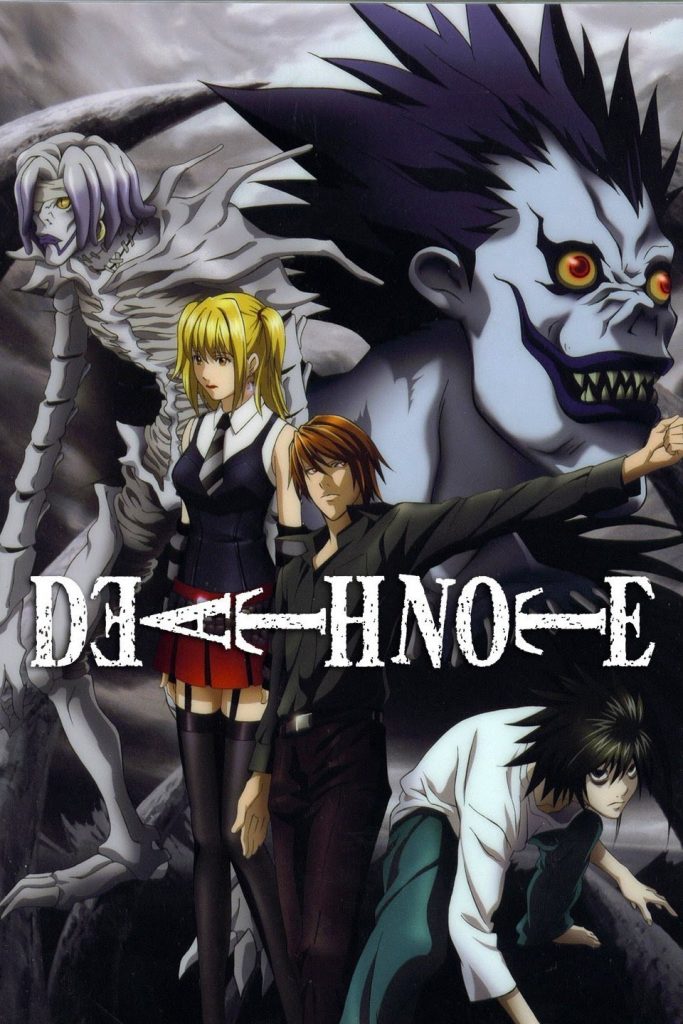
- Release Date : 03 October 2006
- Genre : Mystery, Psychological, Thriller
- Language : Japanese
Death note
When I say anime, you might think of characters with cartoonish (sorry, I couldn’t resist) large eyes and gravity defying, vibrant hair in any shade imaginable. I bet serious discussions on the morality of mankind, the nature of justice and the perils of unchecked power are not things that would come to your mind. But these heavy topics are exactly what Death Note tries to deal with. Does it do a good job though? Let’s see.
Death Note is the anime adaptation of the Manga by the same name, written by Oba and Obata. It follows the story of the young Yagami Light, who happens to find the eponymous Death Note, a book that claims to kill people whose names have been written in it. It doesn’t take him long to verify the truth of the book’s claims, and soon he begins his crusade against evil doers, being egged on by the bored God of Death who dropped the book into the human realm. He meets his match in L, the recluse detective who uses his massive intellect to solve the world’s toughest crimes.
There are several different philosophical ideas that are discussed in Death Note. But the one that stood out to me the most is the question of whether it is the thought that determines the righteousness of a person, or their actions. Almost like the old means versus ends argument. If a person commits a heinous act with the best intentions, are they mostly good? Like, the British attempting to “civilize” their colonies, for instance. Or if a person with the worst intentions ends up doing something good, is he still mostly bad? Like a billionaire setting up a charity to escape taxes.
By playing the nearly opposite, but strikingly similar characters of Light and L against each other, Death Note deigns to answer this moral quandary. In the beginning, we find ourselves deeply invested in Light’s plan to rid the world of scum. Hell, I was as anxious about the possibility of Light getting caught as he was. I found myself fighting against the thought that eventually, Light was, in fact, losing his mind. The slippage of his sanity is gradual as you are going along with the show and you don’t realize it’s happening, but in hindsight, it is glaringly evident. At some point in between, the creators manage to bring you over to L’s side, where we are rooting for this strange detective, who in an effort to catch Light, inserts himself in his life in such a way that we as the audience and Light himself can’t help but feel attached to him.
The tactical speed chess that the two characters keep playing against each other is the main reason why the first segment of the show remains the most interesting. The tension we feel at this time is some of the most delicious in all of anime, and I quickly found that whichever way the show went in the end, it could only end bittersweet for me. I was equally invested in both these characters. I also feel that if L and Light had met each other under different circumstances, they might have even become friends. The fact that their circumstances forced them into being enemies is one of the most tragic parts of the show for me.
The other characters on the show definitely pull their own weight too, each of them played an important part in the shape the story took. The Death God, Ryuk, is one of the most ingenious audience surrogates I have ever seen. He is our window into the mind of Light and probably the only one who gets to hear his actual thoughts and plans. Even the characters introduced later on in the show are allowed to fully develop and don’t feel like they are forced into the story as plot devices. They have their own motivations, and act very much in accordance with them.
Even the deification of “Kira” and his philosophies is something I can see happening in the real world, especially in an overzealously religious country like India. Most would herald Light’s acts as the righteous will of God, and that people who are dying deserve it because of their Karma. I would even expect people to launch protests against L and burn his effigies on the street.
If I had to criticize something about the show, it would be the loss of tension in the second segment because we sort of have an idea of how the story was going to go. Also, echoing Light’s thoughts on the matter, Near and Mello couldn’t quite measure up to their predecessor. Other than that, the pacing, mental warfare and intrigue were maintained throughout the show, and the incredibly high stakes only got higher as the episodes progressed. The gothic soundtrack and cleverly used religious imagery are just the things that elevated this already amazing anime to heavenly heights.
To answer the question I posed in the beginning, Death Note absolutely delivers much more than expected. It forces us to grapple with the fact that we live in a morally grey world, and that right and wrong, are nothing more than human inventions. The continued popularity it enjoys so many years after it first aired shows the timelessness of the topics it deals with. To me, it will forever remain one of the most profound anime ever made, and a testament to the fact that animation is not just a medium to tell kids’ stories.
Disclaimer: The above review solely illustrates the views of the writer.



